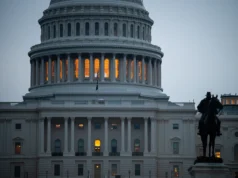
Unclear regulation has consistently been the most significant obstacle hindering cryptocurrency growth in the United States. For years, investors and businesses faced confusion about the legal status of digital assets, making many Americans hesitant to embrace crypto. However, that notion is changing. Since President Trump took office for his second term, he has positioned himself as strongly pro-crypto and taken concrete steps to improve the standing of digital currencies in America. The GENIUS Act is the first law in the United States to regulate cryptocurrency. The act primarily focuses on stablecoins, digital currencies pegged to assets like the U.S. dollar or gold. This shift in U.S. policy reflects Trump’s embrace of the crypto industry and builds on the more crypto-friendly environment he established in the first months of his second term. Here’s why many more Americans are now willing to trust cryptocurrency.
The Trump Effect
 Upon the resumption of office by Donald Trump, it was imminent that the crypto world would experience positive shifts. During his presidential campaign, Trump impressed his supporters, mostly pro-crypto, most notably Elon Musk and Peter Thiel. However, there’s a deeper detail. The economic policy of Trump’s current government focuses on reducing the value of the American dollar to increase exports and, at the same time, protecting the U.S. dollar from losing its place as the world’s financial superpower. To achieve this, the government launched a national U.S. Bitcoin reserve. Why does this matter?
Upon the resumption of office by Donald Trump, it was imminent that the crypto world would experience positive shifts. During his presidential campaign, Trump impressed his supporters, mostly pro-crypto, most notably Elon Musk and Peter Thiel. However, there’s a deeper detail. The economic policy of Trump’s current government focuses on reducing the value of the American dollar to increase exports and, at the same time, protecting the U.S. dollar from losing its place as the world’s financial superpower. To achieve this, the government launched a national U.S. Bitcoin reserve. Why does this matter?
Devaluing the U.S. dollar to improve exports puts it in a tight battle against other fiat currencies like the euro, the British pound, and the yuan. However, a cryptocurrency reserve will lure foreign currency holders to put their capital into cryptocurrencies rather than into currencies that compete with the dollar. These economic moves by the U.S. government involving cryptocurrencies inadvertently influence citizens to place more trust in cryptocurrencies. This, however, is not the only factor.
Crypto’s Growing Utility in the Real World
This is arguably the most compelling reason why many Americans might trust crypto now more than ever. Consumers are loyal to one thing more than a brand name: “interest.” Consumers’ interests could include faster transactions, protection from excess bureaucracy, or convenient investment opportunities with a crypto trading platform.
Conventionally, some bank transfers, especially cross-border ones, take a few days. However, with crypto transactions, funds can be sent worldwide in seconds.
Growing Regulatory Clarity
 Despite the growing popularity of the crypto industry, it’s still at a developmental stage. Coupled with the market volatility, many Americans have been worried about the stability and safety of their assets, a luxury they already enjoy from conventional financial institutions.
Despite the growing popularity of the crypto industry, it’s still at a developmental stage. Coupled with the market volatility, many Americans have been worried about the stability and safety of their assets, a luxury they already enjoy from conventional financial institutions.
To mitigate this fear, several regulatory frameworks have been used by institutions like the Securities and Exchange Commission, among others, to protect end users. Despite these moves, regulations have been unclear and vague until now. However, in one move, the U.S. government’s attempt to improve regulatory clarity throughout the crypto space led to the GENIUS Act, also known as the Guiding and Establishing National Innovations for U.S. Stablecoins Act. Before now, the regulations were unclear, but not anymore. Signed into law in July 2025, the GENIUS Act clarifies consumer protection in the event of bankruptcy and anti-money laundering (AML) sanctions. It ensures transparency regarding crypto issues and who will take on regulatory oversight.
When fully implemented by January 2027, the act is expected to protect cryptocurrency end users and increase public confidence in the blockchain industry.
Improved Consumer Protection
Consumer protection used to be a significant concern in the crypto industry. However, the industry outlook kept improving with transparency laws and tighter regulatory oversight. One notable example demonstrating consumer protection was the seizure of about $225 million worth of cryptocurrencies, allegedly belonging to crypto scammers. The operation was reported to have been carried out by the Secret Service in collaboration with Coinbase.
Several case-by-case lawsuits have also seen consumers get better litigation results against crypto firms. However, with the introduction of the GENIUS Act, consumers can now anticipate safer use of cryptocurrencies. This is especially true for stablecoin holders. The Act stipulates that stablecoin holders have priority claims on reserve assets if an issuer becomes insolvent.
Are Americans Still Wary of Cryptocurrencies?
Several Americans are still, and these are the reasons. Volatility is still a significant concern that can rattle investors because the valuation of tokens can shoot high or drop low in an instant. However, with proper investment knowledge or the use of stablecoins, one can hedge against such experiences. Secondly, some people need more time to understand how cryptocurrencies work. Research showed that four out of 10 Americans are more likely to trust crypto investments. Nevertheless, the gap between scepticism and adoption is narrowing by the day because the crypto industry in the country is getting more regulated, user-friendly, and secure for users.
Large Corporations Adopting Cryptocurrencies
 All over the world, institutions are investing heavily in crypto by purchasing crypto tokens. There must be a good reason why Strategy holds about $71 billion in 639,835 BTC. There are also opportunities for Exchange Traded Funds (ETFs), like stocks that track the price of cryptocurrencies. ETFs help mammoth institutions store capital in more liquid and cost-effective forms. This means that they can keep assets at a lower cost, and these assets can easily be exchanged in the market.
All over the world, institutions are investing heavily in crypto by purchasing crypto tokens. There must be a good reason why Strategy holds about $71 billion in 639,835 BTC. There are also opportunities for Exchange Traded Funds (ETFs), like stocks that track the price of cryptocurrencies. ETFs help mammoth institutions store capital in more liquid and cost-effective forms. This means that they can keep assets at a lower cost, and these assets can easily be exchanged in the market.
Interestingly, ETFs and crypto tokens are not the only ways corporations and institutions adopt cryptocurrencies. Many traditional banks and financial services providers have incorporated crypto transactions into their systems of operation, not to mention their acceptance of crypto custody requests. This mainstream adoption signals the stability and future relevance of cryptocurrencies, and many Americans are taking note.
How Trust in Crypto Is Reaching New Heights
Ten years ago, most Americans’ sentiment towards cryptocurrencies was a mix of negativity and indifference. However, millions of Americans have embraced cryptocurrencies as a financial transaction and investment opportunity. The increased trust is a product of institutional adoption, economic shifts influenced by government policies, crypto’s growing utility, and regulatory clarity. Undoubtedly, a section of the American populace is still sceptical towards cryptocurrencies, but it’s only a matter of time before they get full-scale adoption.
Disclaimer
The information contained in South Florida Reporter is for general information purposes only.
The South Florida Reporter assumes no responsibility for errors or omissions in the contents of the Service.
In no event shall the South Florida Reporter be liable for any special, direct, indirect, consequential, or incidental damages or any damages whatsoever, whether in an action of contract, negligence or other tort, arising out of or in connection with the use of the Service or the contents of the Service. The Company reserves the right to make additions, deletions, or modifications to the contents of the Service at any time without prior notice.
The Company does not warrant that the Service is free of viruses or other harmful components












